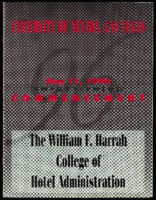Search the Special Collections and Archives Portal
Search Results
University of Nevada, Las Vegas Poster Collection
Identifier
Abstract
Collection is comprised of posters collected by the University of Nevada, Las Vegas (UNLV) Special Collections and Archives from 1974 to 2010. The collection primarily includes posters about events and exhibits hosted by UNLV Special Collections and Archives. Also included are posters for other UNLV events including: theatrical events, sporting events, colloquiums, choral productions, and events where UNLV was a partner.
Archival Collection
Gladys Boggs Marshall Photographs
Identifier
Abstract
The Gladys Boggs Marshall Photographs contain nine black-and-white photographs of Gladys Boggs Marshall from approximately 1912 to 1975. The photographs include three team photographs of the Clark County High School girls' basketball team, of which Gladys Boggs was a member, and four photographs of Gladys Boggs Marshall and her husband Edward B. Marshall spending time with the Ullom Family.
Archival Collection
Margaret Riskin oral history interview
Identifier
Abstract
Oral history interview with Margaret Riskin conducted by Anna Huddleston on August 12, 2014 for the West Charleston Neighborhoods: an Oral History Project of Ward 1. In this interview, Riskin discusses living in Las Vegas, Nevada since 1993. She talks about moving into a home in the Scotch 80s neighborhood, her neighbors, and the home owner association for the neighborhood. Riskin describes security concerns in the Scotch 80s, experiencing a home robbery, and why she decided to relocate. Lastly, Riskin discusses community events held in her neighborhood.
Archival Collection
Fred Holland Jr. oral history interview
Identifier
Abstract
Oral history interview with Fred Holland Jr. conducted by Claytee D. White on April 03, 2019 for the Boyer Early Las Vegas Oral History Project. In this interview, Holland discusses why his family moved to Boulder City, Nevada in 1931 where his father began working on the construction of the Hoover Dam. He talks about the types of work his father did, the means in which his family survived harsh conditions, what it was like going to school in Boulder City, his enlistment in the United States Air Force during World War II, and his experiences with the Boulder City Gun Club.
Archival Collection
Jean Olen Papers
Identifier
Abstract
The Jean Olen Papers (1994-2008) document Olen's career as a taxicab driver in Las Vegas, Nevada. Materials include Olen's personal taxicab driver's permit, medical examiner certificate, and other placards found in taxicabs regarding common questions, such as tipping, no smoking, and airport fees. Also included are newspaper clippings about taxicab drivers in Las Vegas, Nevada and four issues of
Archival Collection

Anita Tijerina Revilla oral history interview: transcript
Date
Archival Collection
Description
Oral history interview with Anita Tijerina Revilla conducted by Marcela Rodriguez-Campo on October 09, 2018 for the Latinx Voices of Southern Nevada Oral History Project. In this interview, Revilla discusses her early life in San Antonio, Texas. She talks about her decision to make education a priority, figuring out the college application process on her own, and her initial interest in social justice. Revilla talks about how her critical consciousness was developed, and her pedagogical approach to teaching. Revilla describes her role in the 2006 May Day march, advocating advocating for the queer community, and disrupting oppressive systems to increase educational access for students. Lastly, Revilla discusses ethnic studies and the history of inequality in the United States.
Text

Transcript of interview with Alfred "Al" Guzman by Barbara Guzman, March 1, 1981
Date
Archival Collection
Description
On March 1, 1981, Barbara Guzman interviewed her father, Alfred “Al” Guzman (born 1932 in El Paso, Texas) about his life in Southern Nevada. Guzman first talks about his occupational history, including his then-current career in public relations for the Sands Hotel and Casino. He then talks about Las Vegas, including social changes, changes in the gaming industry, and mob influence in the casinos. He also talks about Reno, how his job affects the public, and the MX Missile system.
Text

University of Nevada, Las Vegas (UNLV) William F. Harrah College of Hotel Administration 33rd commencement program
Date
Archival Collection
Description
Commencement program from University of Nevada, Las Vegas Commencement Programs and Graduation Lists (UA-00115).
Text

Erma Linda Rivera oral history interview: transcript
Date
Archival Collection
Description
Oral history interview with Erma Linda Rivera conducted by Laurents Bañuelos-Benitez, Nathalie Martinez, Maribel Estrada Calderón, and Barbara Tabach on January 09, 2019 for the Latinx Voices of Southern Nevada Oral History Project. In this interview, Erma Linda Rivera discusses her early life as a grandchild of immigrants. She shares her experiences growing up in a mining town in Arizona. After marrying, both Erma Linda and her husband Jose became federal civil servants. This would lead Erma Linda Rivera to Las Vegas, Nevada in 1984. Prior to retirement, Rivera worked as an regional Equal Employment Opportunity manager. Rivera discusses her career working for the Department of the Interior, sharing how her job helped fuel her passion for social justice. Erma Linda relates the importance of civic involvement in her life. Finally, she reflects on how Henderson, Nevada has changed over the years she has lived there.
Text

